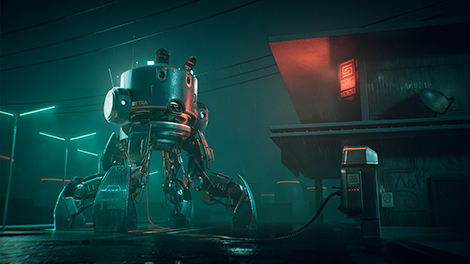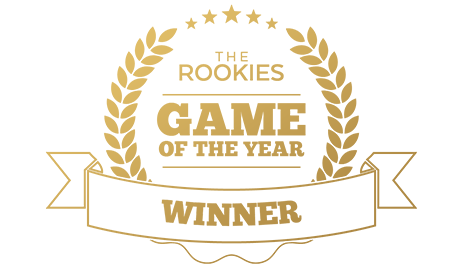N-fx Game Design Studio
BA (Hons) 3D Games Art & Design

No.1 in the world for Game Design & Development (The Rookies 2020)

Our students have won The Rookies Game of the Year four times

We're rated Best Educational Institution in the UK by TIGA 2019
This course includes the options of:

Work placement*

Study abroad*
*No fees are charged for this year
- Key information
UCAS code
- W281
Institution code
H36 School of study
School of Creative Arts Course length
- Full Time, 3 Years
- Sandwich, 4 Years
Location
- University of Hertfordshire, Hatfield
- Entry requirements
UCAS points A Level BTEC 112-120 BBC-BBB - An art and design or creative subject which involves drawing DMM-DDM Additional requirements
GCSE: Grade 4/C in English language and 4/C mathematics
Access course tariff: Diploma with 45 credits at merit.
All students from non-majority English-speaking countries require proof of English language proficiency, equivalent to an overall IELTS score of 6.0 with a minimum of 5.5 in each band.
If you do not have the required IELTS or equivalent for direct entry on to your degree programme, our Pre-sessional English and International Foundation courses can help you to achieve this level.
For more details on the University of Hertfordshire's entry requirements, please visit our Undergraduate Entry Requirements page.
Find out more about International Entry Requirements.
The University of Hertfordshire is committed to welcoming students with a wide range of qualifications and levels of experience. The entry requirements listed on the course pages provide a guide to the minimum level of qualifications needed to study each course. However, we have a flexible approach to admissions and each application will be considered on an individual basis.
- Professional accreditations
The digital animation programme is accredited by The Rookies, SideFX, TIGA and CILECT. This course is proud to be an academic partner with Unreal Engine.




- Sign up for alerts
Get access to personalised content, tailored towards your interests:
- Information on your favourite courses
- Tips to help you through the application process
- Blogs, vlogs and advice from current students
Form successfully completed. Thank you.
Please check, and fix the following possible errors:
Why choose this course?
The next big game has your name on it
You dream of being a key player in the video game industry. You may want to work for companies like Epic Games, Nintendo or Sony. Perhaps you want to work on triple A games like Fortnite, Sea of Thieves and Assassin's Creed, just like some of our graduates? You may not be sure yet where you want to end up, but one thing's for certain. You love gaming. You crave adventure. Gaming allows you to escape to another realm. It's a place where you can be different. Where you can connect with people just like you. Nothing else gives you the same rush. Your perspective of gaming has evolved beyond that of a user. Now you're analysing your experience. You're curiously creative and you have stories to tell. When you daydream it's about scenarios, characters and environments that your fans will enjoy. Your sketch pad is full of playable worlds that you've created. Advancements in technology make this a growing industry with game developers in high demand. Now it's your turn. The next level is within your grasp.
Study a world-famous degree
Described by The Rookies as an 'innovative and enterprising university' our students regularly achieve critical acclaim for their work. Four of our students have won The Rookies Game of the Year award. We're No.1 in the world for Production Excellence in Game Design and Development (The Rookies 2020). At Herts, you'll learn in a real-world studio environment. We'll teach you to create concept art, model and texture within real-time restrictions. You'll gain a thorough understanding of the production process. Our teaching combines passion with experience. We've worked as artists and game developers for years and have insights to share. We'll help you to thrive in a demanding and exciting industry by giving you the artistic and technical skills you'll need. The games industry's own trade association, TIGA, rates the University of Hertfordshire as being the Best Educational Institution in the UK (2019). We have strong links to industry so you can benefit from real world briefs, guest speakers, work placements and knowledge of current trends.
Learn in a stimulating environment
You'll have access to dedicated PC labs, kitted out with everything you need to bring your characters and environments to life. The Learning Resource Centre contains clones of our animation labs (software and hardware) so if you want to continue your animation studies late at night or during the weekend you can. Plus, you can use our motion capture suite, digital photography and filmmaking equipment to work on your projects.
What's the course about?
We'll teach you the artistic and technical skills needed to work in the games industry. We deliver a mix of teaching methods, from project work to software and art-based workshops and lectures. You'll be assessed on group and individual project work. We'll ask you to submit portfolio submissions, sketches, storyboards, 3D game assets and presentations. Plus, you'll develop your analytical thinking, critical curiosity and easy writing skills.
In your first year, you'll benefit from common modules within the wider animation programme, gaining valuable knowledge of the digital media industry. You'll study alongside peers on 2D and 3D animation, comics and concept art and visual effects, expanding your network from day one. We'll teach you the latest software and digital illustration techniques. You'll practice life drawing, designing characters and environments. You'll write engaging stories with a strong narrative arc. You'll explore comics, animation and film history, bringing cultural context to your craft. We'll teach you key skills in texturing, character animation and rigging. Together we'll explore real-time skills such as procedural modelling and level construction. At the end of this year you'll have the choice to switch to a different animation degree course if your passion has led you in a new direction.
In your second year, we'll teach you modular environment construction and level design. You'll explore gameplay design, gameplay mechanics and coding. You'll also try your hand at real time lighting and special effects. You'll take the leap from creating individual art, models and images to developing playable worlds that intrigue and excite. You'll grow in confidence as you see how these environments compliment the stories you want to tell and the game worlds you want to create. You'll work on live projects with industry and design a playable level as part of a team. We'll encourage you to use this industry project to identify the job role you want to work towards. Whether you want to be a game designer or a character, environment or technical artist, by the end of this year you'll know where your passion is guiding you.
In your third year, you'll focus your dissertation on an area of popular culture, linked to 3D games art and design, that fascinates you. You'll also get stuck into an ambitious final games project. You'll take this project through all stages of production, from concept and storyboarding to post-production. You'll prove your project management and leadership qualities. We'll encourage you to engage in real-world practices so you're ready for employment. Your games project will be screened at our Animation Exposé show where you can enter it for different awards, judged by a panel of industry experts. View the show's live stream from 2020. Previous judging panels have included companies such as Creative Assembly, Rare, Rebellion, Jagex, Airship Images and Space Ape Games. Plus, we'll encourage you to enter your work into The Rookies and other international competitions. Our students have won The Rookies Console and PC Game of the Year for 3 consecutive years in 2018, 2019 and 2020! When you graduate, you'll have an impressive professional portfolio, showreel and website to launch your career. This is your chance to showcase your creativity and technical expertise. Capture our imagination. What world will you create?
Your main campus is College Lane
This is where the creative arts, science and health-related subjects are based. This means you'll share the campus with future nurses, scientists, artists and more. You can use the common rooms to relax with friends, work out in the 24-hour gym or have a drink in our on-campus pub or cafes. We also have restaurants for you to eat in or grab something on the go. Our Learning Resources Centres are open 24/7, which means you can study whenever suits you best. Want to pop over to the other campus? You can take the free shuttle bus or walk there in just 15 minutes.
What will I study?
Degree programmes are structured into levels, 4, 5 and 6. These correspond to your first, second and third/final year of study. Below you can see what modules you'll be studying in each.
- Level 4
Module Credits Compulsory/optional Introduction to CG 30 Credits Compulsory This module offers a range of traditional and digital skills that enable the student to advance their knowledge of core areas of aesthetic design and software knowledge. This will form a solid foundation that much of the rest of their studies will to rest on. In addition to learning software skills and subjects such as perspective, composition, colour design, life drawing and photography the module also teaches students how to research visually and also record and reflect on this information. Students learn about successful note taking for their software classes to ensure that they have notes that they can refer to in future projects. The module introduces students to 3D modelling and the experience of bringing a character to life through a selection exercises that will enable students to think about animation and images in motion. Applying CG 30 Credits Compulsory This module progresses the learning of digital skills the students acquired in the previous semester and develops these further while adding a range of new skills. Students will be able to specialise in some areas of their learning, allowing them to study subjects that are specific to their pathways in greater detail. The module will include subjects such as organic modelling, procedural modelling, lighting, rigging, coding and compositing, storyboarding, motion graphics and character animation. In addition to the technical skills, students will experience a group project which requires them to develop their narrative, film-making and collaborative skills through the production of a live action short film. Alongside the practical teaching, a series of lectures about the history of their chosen field will allow students to understand the context of the origin of their subject and to give them a common language of important artworks and artists. Creativity, Concept & Story 30 Credits Compulsory Effective communication in the visual and digital media industries requires an understanding of factors such as narrative construction, composition, colour and character and environment design. This understanding is developed during the module via practical activities that focus on skills of creativity, observation and expression across a range of visual media. These practical skills are used in the creation of concept artwork and short visual narratives that inform, entertain and communicate ideas. The whole process is underpinned by the development of research skills and an awareness of the importance of research into visual and aesthetic traditions and practitioners. Animated Thinking 30 Credits Compulsory With an overarching aim of fostering critical thinking, this module introduces students to an array of perspectives - critical, theoretical, historical and cultural - that will allow them to understand the presence and impact of digital and visual media within society. Alongside this students will be equipped with skills pertaining to academic research and writing in order to craft informed and supported analysis of such media. In the first semester, students will receive a series of introductory lectures – supported by seminars and study skills sessions – that will provide a "toolkit" of critical theories that can be applied to their practice and will lead to an opportunity to exercise academic research and enquiry. In the second semester a series of lectures expands on key areas of focus within visual and digital media – also augmented by seminars and continuing study skills sessions – to support the authoring of a piece of written analysis in relation to a topic from the lectures. - Level 5
Module Credits Compulsory/optional Progressing Games Art 30 Credits Compulsory The module identifies and explores the key concerns and working practices of games art creation. It provides an opportunity for the student to enhance their level of expertise in creating game assets through a series of more advanced games art assignments. In this way students learn some of the more complex areas of modelling, texturing, lighting and preparing the assets they create for use within games engines. Students may also pursue interests in animation or others aspects of the discipline such as character creation and world design. Other key areas of activity such as human anatomy and sculpting techniques will also be explored and there is the possibility for live project briefs to be set by industry partners. Overall the module mixes aesthetic art skills with the technical issues of real time content creation. Creative Project 30 Credits Compulsory This module offers a period of sustained practice which consolidates and extends the digital animation, visual effects, games art, comics and concept art skills established and developed earlier in the course. It enables the student to engage with the entire production cycle of a whole group project, which may be used as part of locating or pinpointing their employment or professional aspirations. The project will usually be within a group and could be a project within their degree cohort, a live project in collaboration with third-parties, work experience, faculty projects or combined projects with students on other years or on other programmes by negotiation. Anatomy studies accompany this module, alongside the showing of professional exemplars in the relevant field that inform the students about the context of their work. Games Design & Professional Practices 30 Credits Compulsory The module explores and develops the student's understanding of games design and pre-production processes that are common to the videogames industry. It considers what makes a game successful, both as an interactive gameplay experience and an aesthetic one. The module analyses the design and gameplay of existing games in order to prepare students for the creation of their own game concepts. Students are supported in the development of their own game ideas, which they present in a branded games design document. The visual aspects of this development process focus on character and environment design, with a grounding in colour studies used to underpin these areas. Students then go on to engage with the implementation of their game ideas through the creation of interactive gameplay and level prototypes. Employment preparation and studio practices will also be engaged with during the module in preparation for Level 6 study. Moving Visions 30 Credits Compulsory Building on skills developed during the Animated Thinking module at level 4, Moving visions furthers students' understanding of current theories surrounding their practice. The module equips students with critical thinking skills, knowledge of good academic practices and the analytical skills needed to develop their dissertation at level 6. In the first semester a series of 'catalyst' lectures supported by seminars and study skills sessions are used to develop students' understanding of critical theories in their field and provide them with the skills needed to perform background research. In the second semester students then select from a range of lecture series and gain insight into a more focussed area of study. These lectures are supplemented by tutorials and seminars to support the authoring of a piece of written analysis in relation to the topic of the lecture series. - Level 6
Module Credits Compulsory/optional Pre-Production for Games 30 Credits Compulsory On this module students explore and develop their understanding of pre-production and design processes within the videogame industry. While the module is freestanding, the outcome of this activity is the development of a project proposal that may form the basis for a major project in the Professional Practices & Degree Project module. It provides an opportunity to undertake the lengthy pre-production work needed for any ambitious videogame project. In carrying out a series of sustained design activities, students on the module are encouraged to enhance their level of expertise and knowledge of pre-production processes. The module draws on negotiated briefs appropriate to the requirements of Level 6 degree study. This enables the student to engage in a sustained process of pre-production and planning enquiry. Professional Practices & Degree Project 60 Credits Compulsory The module engages students with the world of employment and places their work in the context of the standards required for employment entry. Students will complete coursework assignments and use independent study time to develop their awareness of employment opportunities. These assignments will include creative outcomes to engage with prospective employers such as a showreel and associated self-promotional materials. Students then work with staff to negotiate the scope and structure of a major degree project in which they will perform processes within simulated or live professional production environments. This project gives students the opportunity to demonstrate the summation of the creative, technical, contextual and professional skills they have acquired while studying on the course. The results of the project also serve to demonstrate students' overall preparedness for employment or postgraduate studies in the fields of visual and digital media. Concepts in Motion: Articulated Research & Writing 30 Credits Compulsory The module allows students to develop research and writing informed by and useful to their practice. Students select a topic for an extended enquiry, concerning either the specific themes, genre or mode of their degree project, or cultural issues arising from other aspects of their practice. The enquiry involves analytical and contextual interpretation of one or two relevant artefacts, with attention to visual (and other) aesthetics and their cultural relevance. Engaging with critical, theoretical and/or historical perspectives on their topic, students develop their own argument and articulate this in writing. The module thus enables students to achieve an in-depth understanding of significant issues in their practice. The module is delivered through lectures and seminars on research/writing skills and topic development, followed by group and individual tutorials to support work towards the assignments. There is a strong emphasis on independent learning at all stages of the module. - Study abroad
An opportunity for an amazing experience, which will help make you stand out from the crowd. With more and more companies working internationally, experience of living in another country can make a great impression on future employers.
This course offers you the opportunity to enhance your study and CV with a sandwich year abroad. The University has partnerships with over 150 universities around the world, including the USA, Canada, Asia, Africa, Australia, South America and closer to home in Europe.
If you study abroad between your second and third year of study, you'll pay no tuition fee to the partner university and no tuition fee to us either. We'll ask you to make your decision in your second year, so there is plenty of time to think about it.
Find out more about Study abroad opportunities
Please note Erasmus+ funding is only available until May 2023. For students starting their course in September 2022 and wishing to study abroad in 2023-24 or 2024-25, please refer to the Turing Scheme.
- Work placement
Graduate with invaluable work experience alongside your degree and stand out from the crowd.
This course offers you the opportunity to enhance your study and CV with a work placement sandwich year. It's a chance to explore career possibilities, make valuable contacts and gain sought after professional skills.
Our dedicated Careers and Employment team are here to help guide you through the process.
If you take up a work placement between your second and third year of study, at the University of Hertfordshire you'll pay no tuition fee for this year. We'll ask you to make your decision in your second year, so there is plenty of time to think about it.
Find out more about work placements
- What if I need support?
You'll get a personal tutor to guide you through your course, offering academic and pastoral support all the way to graduation. Individual and group tutorials, seminars and regular access to our teaching and technician staff will support you every step of the way. In the School of Creative Arts, we also have a dedicated student liaison officer so you can access academic support with someone who understands the requirements of creative arts courses. Plus, there's additional support if you have dyslexia. For international students, we also have a creative arts international support officer. The Creative Arts Toolkit is a fantastic resource where you can find lots of information about facilities, equipment and study skills.
You might also want or need extra support during your time with us. For help with study skills, including referencing, essay writing and presentations, you'll have access to our academic support services. You can attend workshops, 1-to-1 sessions and online tutorials. Both our LRCs run drop-in study skills sessions. And the best thing is, it's all free. You can feel confident that for all your educational, wellbeing and disability needs, we've got you covered.
The staff are so supportive it's just unreal. Unbelievably hardworking.
Technical lead artist, Montebearo
- What's next for my career?
The digital animation programme prepares you for a range of careers within the industry. These include 2D animator, concept artist, 3D animator, 3D generalist, FX technical director, compositor, environment artist, character artist, technical artist, game designer and a huge variety of roles in between. Our graduates have gone on to work at CD Projekt Red to work on The Witcher, to Epic Games to work on Fortnite, and Rare to work on Sea of Thieves.
Our graduates also work in the visualisation industries, using their design skills in the fields of architecture, product design and automotive design. As a result, we have games graduates employed by Foster and Partners, Taylor James and McLaren F1. Many start their own companies, some of who have become leaders in their fields.
The digital animation programme prepares you for a range of careers within the industry. These include 2D animator, concept artist, 3D animator, 3D generalist, FX technical director, compositor, environment artist, character artist, technical artist, game designer and a huge variety of roles in between. Our graduates have gone on to work at CD Projekt Red to work on The Witcher, to Epic Games to work on Fortnite, and Rare to work on Sea of Thieves.
Our graduates also work in the visualisation industries, using their design skills in the fields of architecture, product design and automotive design. As a result, we have games graduates employed by Foster and Partners, Taylor James and McLaren F1. Many start their own companies, some of who have become leaders in their fields.
- Key staff
Dr Daniel Goodbrey
Digital Animation Joint Programme Leader
Find out more about Dr Daniel GoodbreyMartin Bowman
Digital Animation Joint Programme Leader
Find out more about Martin BowmanNeil Gallagher
3D Games Art & Design Course Leader
Find out more about Neil Gallagher - Further information - includes assessment method
Course fact sheets BA (Hons) (SW) 3D Games Art & Design with Study Abroad Download Programme specifications BA (Hons) Digital Animation Download Additional information Sandwich placement or study abroad year
Optional
Applications open to international and EU students
Yes - How to apply?
International/EU applicants without pre-settled status in the UK
Apply through our international/EU application portal
Home and EU applicants with pre-settled/settled status in the UK
Apply using the links below:
2022
Start Date End Date Link 20/09/2022 31/05/2023 Apply online (Full Time) 20/09/2022 31/05/2023 Apply online (Full Time/Sandwich) 20/09/2022 31/05/2023 Apply online (Full Time/Sandwich) 2023
Start Date End Date Link 18/09/2023 31/05/2024 Apply online (Full Time) 20/09/2023 31/05/2024 Apply online (Full Time/Sandwich) 20/09/2023 31/05/2024 Apply online (Full Time/Sandwich) - Interview
Applicants apply via UCAS or through the International Admissions Office and are then processed by the admissions department based on their current and predicted qualifications. Those selected will be offered an interview and asked to submit online portfolios for review
If you are invited to interview, during the interview you'll need to talk through the contents of your online portfolio of artwork. Please see below for guidance regarding artwork selection. You'll then have a one to one interview with a member of staff (currently this will take place remotely via Zoom). Successful applicants are offered a place on the course.
Interview advice
- Fees and funding
Fees 2021
UK Students
Full time
- £9250 for the 2021/2022 academic year
EU Students
Full time
- £13450 for the 2021/2022 academic year
International Students
Full time
- £13450 for the 2021/2022 academic year
*Tuition fees are charged annually. The fees quoted above are for the specified year(s) only. Fees may be higher in future years, for both new and continuing students. Please see the University's Fees and Finance Policy (and in particular the section headed "When tuition fees change"), for further information about when and by how much the University may increase its fees for future years.
View detailed information about tuition fees
Read more about additional fees in the course fact sheet
Other financial support
Find out more about other financial support available to UK and EU students
Living costs / accommodation
The University of Hertfordshire offers a great choice of student accommodation, on campus or nearby in the local area, to suit every student budget.
View detailed information about our accommodation
Due to the ongoing Coronavirus pandemic, examinations may be replaced by an alternative form of assessment during the academic year 2021/2022. Please refer to the Programme Specification on these pages for further details.
N-fx Game Design Studio
Source: https://www.herts.ac.uk/courses/undergraduate/ba-hons-3d-games-art-and-design
Posted by: pruittaccultoo1942.blogspot.com

0 Response to "N-fx Game Design Studio"
Post a Comment